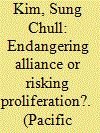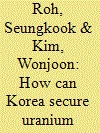| Srl | Item |
| 1 |
ID:
153721


|
|
|
|
|
| Summary/Abstract |
This paper seeks to understand why the United States treated Japan and Korea differently in the revisions of bilateral nuclear cooperation agreements. On the sensitive issue of grating its allies the rights of developing enrichment and reprocessing (ENR), the United States did so for Japan in the 1977 and 1987 revisions, but did not for Korea during the 2015 revision. For the great power as a supplier state, there are two factors affecting the decision: policy-makers’ concern about alliance management prior to the calculation of security outcome, and firms’ commercial interests. In order to avoid damage to the US–Japan alliance and to maintain Japan's complementation for the US nuclear industry, Washington granted the rights of ENR to Tokyo. In contrast, because of its confidence of managing the US–Korea alliance and partly because of incompatibility of commercial interests between the two, Washington did not grant the rights to Seoul at the 2015 revision. Based on the comparison of the two cases, this paper underscores a need to alter the power projection theory regarding nuclear proliferation by explicating the alliance management as the ex ante element of power projection and by accounting for commercial interests such as fuel sale and technological partnership.
|
|
|
|
|
|
|
|
|
|
|
|
|
|
|
|
| 2 |
ID:
133092


|
|
|
|
|
| Publication |
2014.
|
| Summary/Abstract |
South Korea is heavily dependent on energy resources from other countries and nuclear energy accounts for 31% of Korea's electric power generation as a major energy. However, Korea has many limitations in uranium enrichment and spent fuel reprocessing under the current Korea-U.S. nuclear agreement, although they are economically and politically important to Korea due to a significant problems in nuclear fuel storages. Therefore, in this paper, we first examine those example countries - Japan, Vietnam, and Iran - that have made nuclear agreements with the U.S. or have changed their agreements to allow the enrichment of uranium and the reprocessing of spent fuel. Then, we analyze those countries' nuclear energy policies and review their strategic repositioning in the relationship with the U.S. We find that a strong political stance for peaceful usage of nuclear energy including the legislation of nuclear laws as was the case of Japan. In addition, it is important for Korea to acquire advanced technological capability such as sodium-cooled fast reactor (SFR) because SFR technologies require plutonium to be used as fuel rather than uranium-235. In addition, Korea needs to leverage its position in nuclear agreement between China and the U.S. as was the case of Vietnam.
|
|
|
|
|
|
|
|
|
|
|
|
|
|
|
|